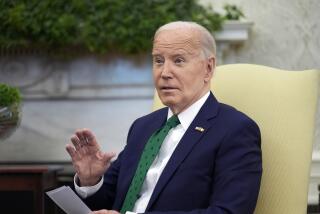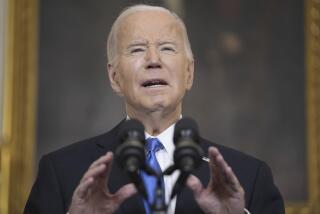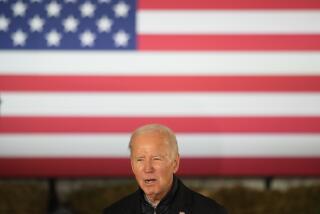Has Biden’s political image been significantly hurt? What we know and what we don’t
For the last several months, former Vice President Joe Biden could enjoy floating above the Democratic presidential field, a potential front-runner shielded by not yet having announced his candidacy.
But as that announcement has neared, scrutiny has begun. This last week, Biden hit the first truly rough patch as a series of women stepped forward to say that his famously touchy-feely style of personal interaction had made them uncomfortable.
Biden’s camp responded, first with testimonials from female supporters, then with a written statement, followed by a video in which the putative candidate promised to be more “mindful” of personal space, as Janet Hook reported.
Sign up for the Essential Politics newsletter »
BIDEN’S TURN IN THE BARREL
The story is still developing — Biden plans a speech Friday to members of the electrical workers union in Washington — and ultimately, voters will have their say. But what do we know so far?
Three facts seem key:
First, none of the women who have stepped forward has alleged conduct that would be considered an assault or harassment.
Biden said in his first response to the controversy, the written statement on Sunday, that “it was never my intention” to make anyone uncomfortable. That denial had the air of a non sequitur: No one has alleged intentional misconduct on his part.
This isn’t a case like that of former Sen. Al Franken of Minnesota, who resigned his seat under pressure from Senate colleagues after several women alleged inappropriate conduct, including aggressive kissing and groping. There’s also no allegation that Biden retaliated against anyone for rebuffing him or damaged anyone’s career.
And, of course, Biden’s conduct doesn’t come close to the numerous allegations of sexual misconduct against President Trump.
What Lucy Flores, the former Nevada assemblywoman, and subsequently several other women have described in Biden’s case is a powerful man invading their personal space in ways that made them uncomfortable. In a party committed to advancing women’s equality, that matters.
Second, Biden’s actions took place in public view — much of it on camera.
One of the most striking aspects of Biden’s situation is that anyone who has followed politics has seen his conduct for themselves. Biden’s putting his hands on nearly everyone he comes across — men and women, old and young — has formed part of his lore for decades, as Michael Finnegan and Melanie Mason wrote.
The statements from women over the last week haven’t introduced new facts so much as they have demanded people think about old facts in a new light.
As Biden said in his video Wednesday, “Social norms have begun to change; they have shifted.”
To a great extent, both Biden’s supporters and his detractors say the same thing: This is “Biden being Biden.” The question is what to make of that.
As Doyle McManus wrote, the risk for Biden is that the allegations will remind voters that he “sometimes sounds outdated and old-fashioned, a throwback to another era.”
Third, although we don’t yet know how voters will respond, we do know that the controversy has attracted their attention.
Some political storms register on social media and among activists but come and go without most voters even noticing. This one, voters have noticed.
The clearest evidence comes from a YouGov survey conducted for the Huffington Post in which 60% of Democrats said they had “heard something negative” about Biden in the last two weeks.
That’s a strikingly high number. By comparison, for most of the Democratic field, fewer than 60% had heard of them at all. That includes the current sensation, Pete Buttigieg, the mayor of South Bend, Ind., whose burst of stardom in recent weeks has pushed his name recognition among Democrats in the YouGov survey almost up to 50%.
Biden’s name recognition, by contrast, is nearly universal. Of the current Democratic candidates, only Sen. Bernie Sanders shares that level of familiarity. And at least so far, that widely familiar image has been a positive one.
Biden still seems set to formally enter the presidential race sometime after Easter, his advisors say. Assuming he does, his image almost surely will grow less favorable — that happens to nearly everyone in a lengthy campaign. The issue for him will be how fast and how steep the decline.
TRUMP RETREATS
The president and his aides have enjoyed Biden’s travails — Trump on Thursday tweeted a video mocking the former vice president.
That glee, however, has only given some respite from an otherwise difficult week. As Eli Stokols, Jennifer Haberkorn and Noah Bierman reported, Trump spent the week in retreat on several fronts.
The most notable came on his highly publicized threat to “close the damn border.” After Senate Republican leader Mitch McConnell called that idea potentially “catastrophic” and experts warned of billions in economic damage, Trump backed away.
He partially covered his retreat by issuing a new threat — to put tariffs on Mexican auto imports sometime next year if Mexico’s government doesn’t do more to block migration by Central Americans seeking asylum in the U.S. That threat seemed only slightly more credible than closing the border since the revised NAFTA that Trump is pushing would prevent it.
Trump plans to visit the California-Mexico border on Friday.
Trump also retreated on healthcare after saying Republicans should reopen the debate this year on repealing Obamacare. McConnell and other Senate Republicans made clear they would do no such thing.
The administration continues to undermine the healthcare law, however. As Noam Levey wrote, skimpy health plans that the Trump administration has allowed on the market have begun to bring back some familiar problems for consumers who discover the coverage they’ve paid for doesn’t cover much when they need it.
WOMAN IN THE HOT SEAT
Homeland Security Secretary Kirstjen Nielsen has one of the hardest jobs in Washington, made more difficult by a president who frequently undercuts her and threatens to fire her.
As Molly O’Toole wrote in an excellent profile of Nielsen, the secretary has managed to hang onto her job, but at a very steep price.
MONEY REPORTS SHAPE THE DEMOCRATIC FIELD
Sunday brought the deadline for first-quarter financial contributions.
Democratic candidates will publicly report their money raised and spent to the Federal Election Commission later this month. As is typically the case, however, those with a good story to tell moved quickly to put out their fundraising numbers in advance of the public reports.
Sanders’ big haul, $18.2 million from 525,000 donors, set the pace for the rest of the field, as Evan Halper and Hook wrote. While Sanders’ first three months didn’t set a record, they did show that his base of support from 2016 has remained very much intact and ready to give.
Buttigieg has also capitalized on his sudden burst of media attention, raising $7 million from more than 158,000 donors. Sen. Kamala Harris also reported strong fundraising, $12 million from 138,000 donors.
Former congressman Beto O’Rourke reported raising $9.4 million. His campaign noted that all came in just 18 days, implying he could outpace his rivals in the months to come. Detractors raised doubts about that, noting that the rate of his fundraising slowed notably after his first day.
One big source of money for Democratic candidates has been Silicon Valley. The candidates are still coming through, but they’re keeping a much lower profile than in the past. Their reticence highlights the fact that Silicon Valley has become much less popular among Democrats, Halper wrote.
EMBRACING BLACK IDENTITY
Harris and Sen. Cory Booker have set a new standard for black candidates in a presidential campaign, Jaweed Kaleem and Melanie Mason wrote. In the 2008 cycle, candidate Barack Obama downplayed race. Harris and Booker have celebrated their identities, reflecting the way the Democratic Party has changed.
Another example of the party’s greater openness to minority concerns came this week as the candidates flew to New York to embrace the Rev. Al Sharpton, who has reinvented himself as a kingmaker in the party, Halper wrote.
Meanwhile, labor unions have taken a cautious approach to the primaries. Many unions moved quickly in 2016 to endorse Hillary Clinton, only to face revolts among rank-and-file members. This year, some of the biggest unions may sit the primaries out, Halper reported.
TRUMP CHALLENGERS?
The White House has taken several steps to squelch possible primary challenges to Trump, Mark Barabak and Stokols reported. But a few Republican prospects still eye possible challenges, notably Maryland’s Gov. Larry Hogan, whose criticisms of Trump have only helped his already high popularity at home.
LEARNING TO DEAL WITH PELOSI
Trump has a bit more than 90 days to get his proposed new trade deal with Mexico and Canada through Congress. It’s the administration’s biggest legislative priority — practically the only one, in fact.
As they ponder how to get the deal passed, White House officials have started to come to grips with the reality that their fate depends on making a deal with Speaker Nancy Pelosi, who controls what comes to the House floor.
As Bierman, Haberkorn and Don Lee reported, administration officials remain divided about whether to negotiate directly with Pelosi and, if so, how to keep the president from blowing up any talks.
Elsewhere in Congress this week, House Democrats prepared subpoenas to demand the full Mueller report. Atty. Gen. William Barr is expected to provide Congress a redacted version of the report late next week or early the following week.
McConnell changed Senate rules to allow Trump to win confirmation of judges even faster.
And the House voted to renew the Violence Against Women Act, but Democrats made the vote difficult for Republicans by including a provision that would ban gun sales and ownership by a person convicted of stalking, Sarah Wire wrote. Gun-rights advocates oppose that, and prospects in the Senate remain uncertain as a result.
LOGISTICS
That wraps up this week. Until next time, keep track of all the developments in national politics and the Trump administration at our Politics page and on Twitter @latimespolitics.
Send your comments, suggestions and news tips to politics@latimes.com.
If you like this newsletter, tell your friends to sign up.
More to Read
Get the L.A. Times Politics newsletter
Deeply reported insights into legislation, politics and policy from Sacramento, Washington and beyond. In your inbox three times per week.
You may occasionally receive promotional content from the Los Angeles Times.







